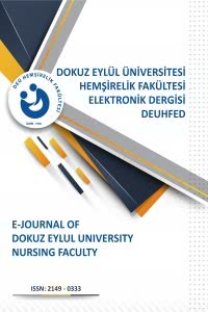Doğum Destekçilerinin Doğum Eylemine Destek Konusundaki Görüşleri ve Gereksinimleri
Opinions and Requirements of Companionship to Support on Labour
___
- 1.Karaçam Z, Akyüz EÖ. Doğum eyleminde verilen destekleyici bakım ve ebe/hemşirenin rolü. FNJN 2011;19(1):45-53. 2. World Health Organization. Intrapartum care for a positive childbirth experience [online] 2018 URL: https://www.who.int/reproductivehealth/publications/intrapartum-care-guidelines/en/. 20 Nisan 2018.
- 3.Nilsson C, Lundgren I. Women’s lived experience of fear of childbirth. Midwifery 2009;25(2):1–9.
- 4.Mete S, Çiçek Ö. Doğum desteği: Yeniden önem kazanmaya başlayan bir uygulama. Bezmialem Science 2018;6(2):138-143.
- 5.International Confederation of Midwives. International code of ethics for midwives [online] 2014. URL:http://www.hebammen.at/wp-content/uploads/2017/04/International-Code-of-Ethics-for-Midwives.pdf. 17 Nisan 2018.
- 6.Banda G, Kafulafula G, Nyirenda E, Taulo, F, Kalilani L. Acceptability and experience of supportive companionship during childbirth in Malawi. BJOG 2010;117(8):937–45.
- 7. World Health Organization. Safe childbirth checklist implementation guide [online] 2015;1-62. URL:https://apps.who.int/iris/bitstream/handle/10665/199177/9789241549455_eng.pdf;jsessionid=CBF1234015FB96D07D3F 9D9B44BF238D?sequence=1.22 Nisan 2018.
- 8.Sağlık Bakanlığı. Sağlıkta verimlilik, kalite ve akreditasyon dairesi başkanlığı sağlıkta kalite standartları. [online] 2016. URL:https://dosyamerkez.saglik.gov.tr/Eklenti/3460,skshastanesetiv5r1pdf.pdf?0.17 Nisan 2018.
- 9.Kashanian M, Javadi F, Haghighi MM. Effect of continuous support during labor on duration of labor and rate of cesarean delivery. BJOG 2010;109(3):198-200.
- 10.Güleç D, Öztürk R, Sevil Ü. Kazandı M. The relationship between fear of birth and perceived social support of pregnant women. Turk J Obstet Gynecol 2014;24(1):36-41.
- 11.Mete S, Uludağ E. Doğumda destekleyici bakımda hypnobirthing felsefesinin kullanılması. DEUHFED 2017;10(1):52-59.
- 12. World Health Organization. Pregnancy, childbirth, postpartum and newborn care: a guide for essentialpractice.[online].2015;1- 184.URL: https://www.who.int/maternal_child_adolescent/documents/imca-essential-practice-guide/en/. 20 Nisan 2018.
- 13.Bohren MA, Munthe-Kaas H, Berger BO, Allanson EE, Tunçalp Ö. Perceptions and experiences of labour companionship: a qualitative evidence synthesis. Cochrane Database Syst Rev 2016;(12):1-10.
- 14. World Health Organization. Recommendations on health promotion interventions for maternal and newbornhealth [online] 2015;2-94 URL: https://apps.who.int/iris/bitstream/handle/10665/172427/9789241508742_report_eng.pdf?sequence=1.22 Nisan 2018.
- 15.Bohren MA, Hofmeyr GJ, Sakala C, Fukuzawa RK, Cuthbert A. Continuous support for women during childbirth. Cochrane Database Syst Rev 2017;(7):1-173.
- 16. Association of Women's Health, Obstetric and Neonatal Nurses. Nursing support of laboring women. JOGNN 2011;40 (5):665- 666.
- 17.International Confederation of Midwives. Essential competencies for basic midwifery Practice [online].2018.URL: https://internationalmidwives.org/assets/uploads/documents/CoreDocuments/ENG%20Definition_of_the_Midwife%202017.p df. 20 Nisan 2018.
- 18.Sağlık meslek mensupları ile sağlık hizmetlerinde çalışan diğer meslek mensuplarının iş ve görev tanımlarına dair yönetmelik [online] 2014. URL: http://www.resmigazete.gov.tr/eskiler/2014/05/20140522-14.htm. 8 Mart 2018.
- 19.Lazzaretto E, Nespoli A, Fumagalli S, Colciago E, Perego S., Locatelli A. Intrapartum care quality indicators: A literature review. Minerva Ginecologica 2018;70(3):346-56.
- 20.Sağlık Bakanlığı. Anne dostu hastane programı. [online] 2012. URL: https://sagligim.gov.tr/kadin-sagligi/liste/41-anne-dostuhastane-program%C4%B1.html. 17 Nisan 2018.
- 21.Aksayan S, Emiroğlu N. Araştırmanın tasarımı. 1.Baskı. Erefe İ. İstanbul Odak Ofset; 2002:65-124.
- 22.Başkale H. Nitel araştırmalarda geçerlik, güvenirlik ve örneklem büyüklüğünün belirlenmesi. DEUHFED 2016;9(1):23-28.
- 23.Shakibazadeh E, Namadian M, Bohren MA, Vogel JP, Rashidian A, Pileggi VN. Respectful care during childbirth in health facilities globally: a qualitative evidence synthesis. BJOG 2018;125(8):932-942.
- 24.Bohren MA, Hunter EC, Munthe-Kaas HM, Souza JP, Vogel JP, Gülmezoglu AM. Facilitators and barriers to facility-based delivery in low- and middle-income countries: A qualitative evidence synthesis. Reproductive Health 2014;11(71):2-17.
- 24. Bohren MA, Hunter EC, Munthe-Kaas HM, Souza JP, Vogel JP, Gülmezoglu AM. Facilitators and barriers to facility-based delivery in low- and middle-income countries: a qualitative evidence synthesis. Reproductive Health 2014;11(71):2-17.
- 25.Bruggemann OM, Osis MJ, Parpinelli MA. Support during childbirth: perception of health care providers and companions chosen by women. Revista de Saúde Pública 2007;41(1):44–52.
- 26.Kozhimannil KB, Hardeman RR, Attanasio LB, Blauer-Peterson C, O’Brien M. Doula care, birth outcomes and cost among medicaid beneficiaries. Am J Public Health 2013;(103);113-21
- 27.Hodnett ED, Gates S, Hofmeyr GJ, Sakala C. Continuous support for women during childbirth. Cochrane Database Syst Rev 2013;(7):2-118
- 28.Munoz EG, Collins M. Establishing a volunteer doula program within a nurse-midwifery education program: a winning situation for both clients and students. J Midwifery Womens Health 2015;60:274
- 29.Kabakian-Khasholian T, El-Nemer A, Bashour H. Perceptions about labor companionship at public teaching hospitals in three Arab countries. Int J Gynaecol Obstet 2015;129(3):223–6.
- 30.Beake S, Chang YS, Cheyne H, Spiby H, Sandall J, Bick D. Experiences of early labour management from perspectives of women, labour companions and health professionals: A systematic review of qualitative evidence. Midwifery 2018; (57): 69-84.
- 31.Approaches to limit intervention during labor and birth. ACOG Committee Opinion No. 766. American College of Obstetricians and Gynecologists. Obstet Gynecol [online] 2019;133.URL: https://www.acog.org/-/media/Committee-Opinions/Committeeon-Obstetric-Practice/co766.pdf?dmc=1& ts=20190204T2356061672. 10 Temmuz 2019
- 32.Steel A, Frawley J, Adams J, Diezel H. Trained or professional doulas in the support and care of pregnant and birthing women: A critical integrative review. Health Soc Care Community 2015;23(3):225–41.
- ISSN: 2149-0333
- Yayın Aralığı: Yılda 4 Sayı
- Başlangıç: 2008
- Yayıncı: Dokuz Eylül Üniversitesi Hemşirelik Fakültesi
Doğum Destekçilerinin Doğum Eylemine Katılma Konusundaki Görüşleri ve Gereksinimleri
piritüel Bakım Gereksinimleri Ölçeği Türkçe Formunun Geçerlik ve Güvenirliği
Elif GÜNAY İSMAİLOĞLU, HANDAN ÖZDEMİR, AHMET EROL, AYTEN ZAYBAK
Meslek Hastalığının Boyutları ve Meslek Hastalıklarından Korunmada İş Sağlığı Hemşiresinin Rolleri
Akgün YEŞİLTEPE, Gülendam KARADAĞ
ŞERİFE TUTAR GÜVEN, AYLA KAYA, AYŞEGÜL İŞLER DALGIÇ
Üniversitede Çalışan Kadınların Meme Kanserı̇nde Erken Tanıya Yönelı̇k Sağlık İnançları
Doğum Destekçilerinin Doğum Eylemine Destek Konusundaki Görüşleri ve Gereksinimleri
Hemşirelik Doktora Öğrencilerinin Araştırma Etiği Hakkındaki Görüşlerinin İncelenmesi
TUĞBA YARDIMCI GÜREL, CANAN DEMİR BARUTCU, HATİCE MERT
Hemşirelik Öğrencilerinin Bakım Planlarının Pediyatrik Ağrı Yönetimi Açısından İncelenmesi
Spiritüel Bakım Gereksinimleri Ölçeği Türkçe Formunun Geçerlik ve Güvenirliği
Ahmet EROL, Ayten ZAYBAK, Handan ÖZDEMİR, Elif GÜNAY İSMAİLOĞLU
